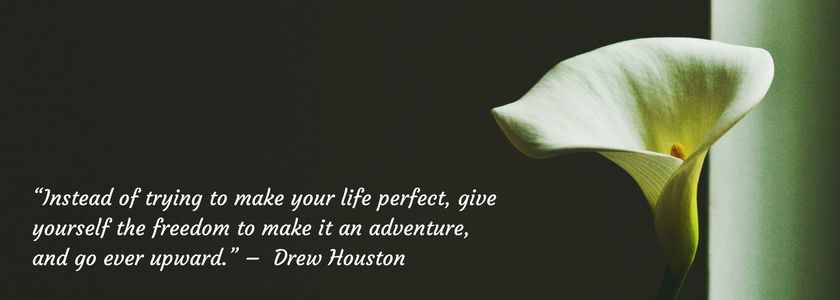Why Trying to Be Perfect Isn’t Perfect

We Are Not Perfect
Guess what? I’m not perfect. Yes, a shocker to my friends and family, I’ll admit it. As much as I love to have things in order and feel so much better when everything is put away where it belongs, I’m only human and I’ve made a mistake or two plenty of mistakes in my life.
In this article, I’m going to address why trying to be perfect isn’t perfect. I think a lot of people who lean towards perfectionistic tendencies are very hard on themselves. Individuals who struggle with this often have very high expectations for themselves, and sometimes for other people, as well.
They may also feel that others hold them up to sky-high standards even when this is not the case at all. They may be worried that if they are not perfect or don’t do things perfectly that they will let someone down or feel embarrassed.
Instead of trying to make your life perfect, give yourself the freedom to make it an adventure, and go ever upward. – Drew Houston
Here are five ways to stop perfectionism from getting in the way of completing your goals:
1. Let Something Be “Good Enough”
It can be challenging to embrace the “good enough” mindset. In my experience, I’ve found that when I’ve allowed for things to be good enough, I’ve become unstuck and more able to move to the next step or task. Allowing something to be good enough does not mean that your standards have been lowered, but that you acknowledge the result is okay.
I know this can be difficult, especially when you have the ideal solution formulated so clearly in your mind’s eye. Create a standard that is reasonable. My personal standard is that if the solution is at least 80% of what I envision, I can call it done. This works when I find myself toiling to make something “just right”. I can choose to continue tweaking until I’m happier, or I can choose to be satisfied with what is and move to the next thing on my list. In most cases, it can always be tweaked and improved later.
Oftentimes, people with perfectionistic outlooks not only have extremely high standards for themselves, but they think that other people also have those same high standards for them as well. One way to gauge this? Ask others for their feedback to allow reality to take hold.
2. Create a Plan
Define before you start what constitutes “good enough”, then stop once that’s been achieved and make a plan to circle back at a later time. Perfectionism can be borne from a need to be in control and making a plan can help stop the obsession of perfectionism.
For Example:
- Define what constitutes “good enough”
- Create a deadline or checkpoint
- Work on your task
- At your checkpoint, review that what you are doing is still relevant
- Make revisions to your plan if needed, and keep going
3. Accept Your Humanity, Learn, and Move On
It is human to mess up once in awhile. Each and every one of us does it. I’m sure you’ve heard this quote before:
To err is human, to forgive, divine. – Alexander Pope
So, forgive and accept your humanity, then don’t look back (unless you’re aiming to learn something). Every day, every hour, every minute is an opportunity to start anew. You have the power and the choice to keep moving forward.
4. Let Go of Perfection, Let In Flexibility
Those who have perfectionistic tendencies may find the word “flexibility” a little bit scary. It can represent a loss of control, a fear often associated with perfectionism. The ability to allow flexibility in your life, and have some “bendability” can also help allow relief from stress and depression.
Inviting the opportunity for change often improves your ability to ebb and flow better with ideas you or other people have. Being more open to “not perfect” can also benefit you in giving you a more realistic, even optimistic outlook.
5. Start Small
Perfectionism can cause analysis paralysis and procrastination. Another side effect is failing to finish.
One way to combat these conditions is to start small. Break down your task into smaller and smaller pieces until you feel like you can accomplish something. It could be something really tiny if that’s what it takes to get the ball rolling. Sometimes all it takes is a bit of momentum. Once that goes, it seems to start flowing. It’s Newton’s law of inertia in action.
An object at rest will remain at rest unless acted on by an unbalanced force. An object in motion continues in motion with the same speed and in the same direction unless acted upon by an unbalanced force. This law is often called. “the law of inertia“.
Organizing Action Item:
Is perfectionism holding you back from enjoying and being productive in your home or office? Select an area of your home or office that is currently causing stress for you or others. Create your plan for how you’ll get started. If you’ve started, but are having difficulty finishing, create your plan to finish. Share your plan in the comments.


